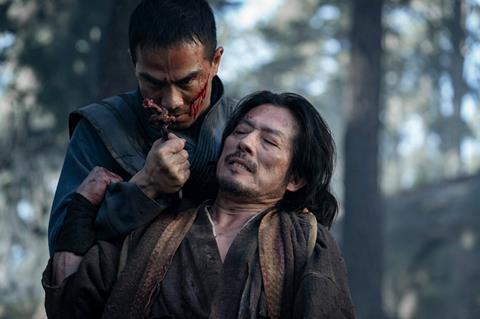The only epic element of this Warner Bros reboot is the level of violence onscreen

Dir: Simon McQuoid. US. 2021. 110 mins.
Bloodier but not better, the rebooted Mortal Kombat is a far more violent affair than the 1995 original, hewing closer in spirit to the gory video game that inspired the film franchise. And while there is some fleeting gross-out glee in watching the martial-arts carnage — pulverised heads, severed limbs, a beating heart torn from a victim’s chest — the overkill only underlines how feeble the storytelling is otherwise. Making his feature debut, commercial director Simon McQuoid has fashioned a less-jokey Mortal Kombat, but a darker, more adult tone does nothing to distract from the fact this very juvenile property has little to offer beyond kicking, pummelling and impaling.
As unapologetically gruesome as the game
In the US, Warner Bros will release the picture simultaneously in theatres and on HBO Max on April 23. (UK viewers can rent the film on-demand the same day.) It has been nearly 25 years since the most recent instalment, Mortal Kombat: Annihilation, and no doubt the studio hopes that viewers will appreciate this graphic take on the material. Without stars in the cast, though, the brand name may not be enough of a selling point.
Lewis Tan plays Cole Young, a MMA fighter rescued by Jax (Mehcad Brooks), a virtuous warrior who protects him from an attack by Sub-Zero (Joe Taslim), a mystical assassin sent to kill him. Cole is informed he is destined to be part of a team that will represent Earth in an interstellar competition known as Mortal Kombat — and that he must gather the other team members, including Sonya Blade (Jessica McNamee). If they are defeated in Mortal Kombat, our planet will be invaded by the denizens of Outworld, led by the malicious sorcerer Shang Tsung (Chin Han).
For those who love the video game, which consists of two combatants duking it out to the death, this new Mortal Kombat features the familiar catchphrases and popular characters. (However, novices will be puzzled why certain seemingly unimportant lines, such as “flawless victory”, are spoken with such gravitas.) But unlike the 1995 Mortal Kombat and its sequel, the reboot isn’t worried about catering to the widest audience possible, instead amplifying the bloodshed and vulgarity to earn a more restrictive rating.
This edgier approach is reflected early on in the new film: during a fight scene in 17th-century Japan, the body count is high as blood spurts across the screen. The action sequences, edited by Dan Lebental and Scott Gray, are relatively compelling, with McQuoid emphasising their visceral brutality without sacrificing visual coherence. Especially after the tame battles of the 1990s films, it can be fun to experience a Mortal Kombat that is as unapologetically gruesome as the game.
But any attempt to make these characters more nuanced or realistic is a losing proposition. To be fair, Tan and his costars stay away from the knowing cheesiness exhibited by the actors in the previous pictures, but even so, there’s not much that can be done with generic heroes who don’t have any semblance of an interior life. (The closest we get to seeing anyone’s insides is when their organs are ripped from their bodies.) Greg Russo and Dave Callaham’s screenplay tells a very predictable story of a humble everyman who is actually the Chosen One meant to save the universe, but Cole is so ordinary that his saga never feels very special.
Of course, Mortal Kombat was never about its story — the violence is the main attraction — and the fight choreography is several steps up from the earlier films. In addition, the effects are more impressive, particularly the rendering of the CG creation Goro, a four-armed beast who wants to destroy the Earthlings. But it’s nearly impossible to care about what transpires.
Among the supporting cast, Josh Lawson is briefly entertaining as the wisecracking mercenary Kano, although his effectiveness as comic relief is hampered by a screenplay with an adolescent sense of humour. What’s worse, Kano’s clunky one-liners are juxtaposed with the overly solemn proclamations made elsewhere. As the wise elder Lord Raiden, who looks after the Earthlings, Tadanobu Asano must utter pseudo-profound dialogue with severe sincerity.
If the 1990s films were too goofy and lightweight, the reboot’s stab at dramatic grandeur robs the proceedings of some of the giddy mindlessness that made the video game such a guilty pleasure. Even Benjamin Wallfisch’s self-important score strains for an epic sweep that McQuoid never comes close to achieving. The more serious this new Mortal Kombat tries to be, the sillier it seems.
Production companies: Atomic Monster, Broken Road
Worldwide distribution: Warner Bros
Producers: James Wan, Todd Garner, Simon McQuoid, E Bennett Walsh
Screenplay: Greg Russo and Dave Callaham, story by Oren Uziel and Greg Russo, based on the video game created by Ed Boon and John Tobias
Production design: Naaman Marshall
Editing: Dan Lebental, Scott Gray
Cinematography: Germain McMicking
Music: Benjamin Wallfisch
Main cast: Lewis Tan, Jessica McNamee, Josh Lawson, Tadanobu Asano, Mehcad Brooks, Ludi Lin, Chin Han, Joe Taslim, Hiroyuki Sanada






![The Brightest SunScreen[Courtesy HKIFF]](https://d1nslcd7m2225b.cloudfront.net/Pictures/274x183/3/5/0/1448350_thebrightestsunscreencourtesyhkiff_312678.jpg)















![The Brightest SunScreen[Courtesy HKIFF]](https://d1nslcd7m2225b.cloudfront.net/Pictures/100x67/3/5/0/1448350_thebrightestsunscreencourtesyhkiff_312678.jpg)

